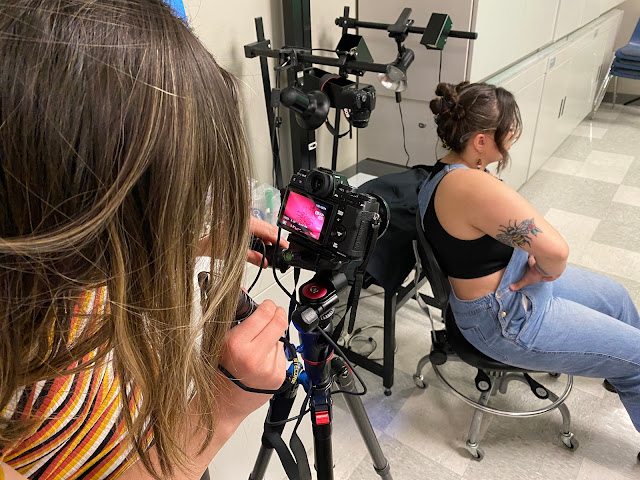Note: In recognition of forensic science's contribution to the criminal justice system, the week of September 18-24 is designated as National Forensic Science Week.
 |
Forensic Science Student Alexis Maurice explains her theories during a mock scenario. |
Before sliding to the floor with a scripted deathly groan, SLCC forensic science student, Alexis Maurice gave her final thoughts on how her character might have met her demise. Not only do students in Assistant Professor Stephanie Hoffman’s Crime Scene Processing course participate in a mock crime scene complete with evidence like fake blood spatter they also conduct group research projects that seek to fill gaps in the field of forensic science.
 |
Alexis participates in a mock scenario. |
Alexis investigated the best filters and infrared and ultraviolet wavelength combinations for imaging and documenting tattoos for identification purposes. This is important as crime labs are backlogged, and databases of DNA and fingerprints “are not as extensive as television would lead you to believe,” said Alexis. She says that over 30% of the U.S. population has tattoos and creating standards for imaging techniques could lead to crime labs being more apt to use tattoos to identify missing persons and offenders.
 |
Alexis takes an infrared photo of a tattoo for her research project. |
Alexis presented her research with a poster at the International Association for Identification (IAI) conference. Alexis was competing against 15 other students who “were 1–2-year research projects from Ph.D., Masters, and Bachelors programs funded via external grants and supported by professional labs and organizations,” said Stephanie. “Alexis not only impressed judges with the quality of her research but with her ability to communicate about the research and why it was so important.”
 |
Alexis explains her research at the IAI conference. |
Alexis said that she didn’t think she had a chance at winning the poster contest. “I was thinking, I didn’t work with this big company, and I’m also at a community college.” But she said that looking over the other posters and listening to the other student presentations; she could see how “some people got lost because they were so statistic heavy.”
Alexis said that Professor Hoffman teaches her students how to conduct research, the critical thinking skills needed to process a crime scene, and how to communicate about what they are doing and finding.
These essential communication skills made the difference for Alexis at the conference. -Stephanie Hoffman
Alexis came away with a first-place win and scholarship award. Her research titled “A Spectrum of Possibilities: The Preliminary Assessment of Ultraviolet (UV) and Infrared (IR) Imaging for Tattoo Identifications” will be featured in future IAI publications.
 |
Assistant Professor Stephanie Hoffman poses with Alexis and her first-place poster. |
Alexis Maurice said her interest in the field started at Highland High School, where her fascination with photography led to her taking a forensic science class. Learning more about the area led her to consider forensic science as a career, and at SLCC, she enrolled in Assistant Professor Stephanie’s forensic science classes.
In her second-year teaching at SLCC, Stephanie is doing much to try and elevate SLCC’s Forensic Science program. Alexis noted that Stephanie has high standards for students' work in her classes, but the payoff is worth it. Stephanie said that having students be able to run mock crime scene scenarios and present their research projects at conferences goes a long way to building a better program.
According to Stephanie, there is a shortage of forensic science workers. She encourages students interested in pursuing forensic science, law enforcement, or legal careers to enroll in CJ 1350: Intro to Forensic Science and then CJ 2480 Crime Scene Processing.
As for Alexis, she is currently finishing up some generals at SLCC. After graduating with an A.S. degree in Criminal Justice, with a Forensic Science emphasis, she plans to transfer to UVU to pursue a B.S. in Forensic Science with a Forensic Investigation emphasis. She says that forensic science is essential for catching criminals and proving innocence. Alexis says Stephanie's classes are so well done that any student, regardless of their major, should check it out.

Comments
Post a Comment